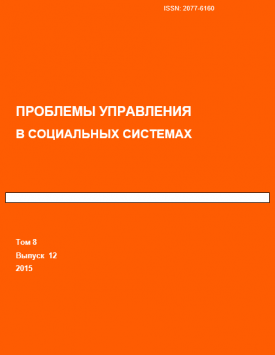Agent-based simulation model of election campaign
In article, the structure of agent-based simulation model of election campaign is considered. Based on the analysis of theories of electoral behavior the system of the factors characterizing conditions of campaign process, social and demographic characteristics of electorate, electoral technologies practiced in campaign, influence of interpersonal communication and electoral technologies on voters is offered. The opinion of the agent ("pro" or "contra") on each step is defined one the basis of its individual characteristics with influence of interpersonal communication and electoral technologies. The pilot version of model on the NetLogo platform is constructed. The offered model may be helpful for forecasts of results of election campaigns and assessment of effectiveness of application of various electoral technologies, building of both static and dynamic strategies of carrying out different election campaigns.
Keywords
computational sociology,
social simulation,
NetLogo,
agent-based simulation,
simulation modeling,
election technology,
election campaign,
имитационное социальное моделирование,
вычислительная социология,
NetLogo,
агентное моделирование,
имитационное моделирование,
избирательная технология,
избирательная кампанияAuthors
| Evseev Evgenii A. | Saint-Petersburg State University | e.evseev@spbu.ru |
| EfimOva Evgenia D. | Saint-Petersburg State University | jenchik.e@list.ru |
Всего: 2
References
Каталевский Д.Ю. Основы имитационного моделирования и системного анализа в управлении. - М.: Изд-во Моск. ун-та, 2011. - 304 с.
Дегтярев А. А. Основы политической теории. - М.: Высш. шк., 1998. - 239 с.
Устименко С. По ком звонит колокол - по политтехнологам? // Избирательные технологии и избирательное искусство. - М.: РОССПЭН, 2001. - 17 с.
Downs A. An Economic Theory of Democracy. - New York, 1957.
Алескеров Ф.Т., ОртешукП. Выборы. Голосование. Партии. - М.: 1995. - 208 с.
Кудинов О. П. Большая книга выборов: как проводятся выборы в России. - М.: Арт Бизнес Центр, 2003. - 38 с.
Taveras P. An Agent-Based-Modelling for Electoral Preference Behavior: presidential Elections of the Dominican Republic 2012 // European Scientific Journal. - 2013. - Vol. 9, № 19. P. 504-509.
Яровый А.В., Мамонтов А.Ю. Применение системной динамики в моделировании тенденций общественного поведения на примере создания модели реакции населения на предвыборные кампании представителей политической власти // Известия Том. политехнического университета. Томск: НИТПУ 2014. - Т. 324, № 6. - С. 6-13.
Ожиганов Э.Н. Моделирование и анализ политических процессов. -М.: РУДН, 2009. - 189 с.
Ожиганов Э.Н. Стратегический анализ политики: Теоретические основания и методы. - М.: Аспект Пресс, 2006. - 272 с.
Jing-Kai Lou, Fu-Min Wang, Chin-Hua Tsai, San-Chuan Hung, Perng-Hwa Kung,Shou-De Lin, Kuan-Ta Chen, and Chin-Laung Lei. A Social Diffusion Model with an Application on Election Simulation // The Scientific World Journal. Hindawi, 2014. - Vol. Article Number: 180590. - 14 p.
Минаев В.А., Овчинский А.С., Скрыль С.В., Тростянский С.Н. Как управлять массовым сознанием: современные модели. - М.: Изд-во Рос. нового ун-та, 2013. - 250 с.
Тростянский С.Н. Моделирование динамики электоральных процессов на основе уравнений диффузии инноваций // Системы управления и информационные технологии. - Воронеж: ООО Издательство «Научная книга», 2007. - Т. 29, № 3.2. - С. 302-306.
Каталевский Д.Ю., Солодов В.В., Кравченко К.К. Моделирование поведения потребителей // Ежеквартальный Интернет-журнал «Искусственные общества». - 2012. - Т. 7, № 1-4.

